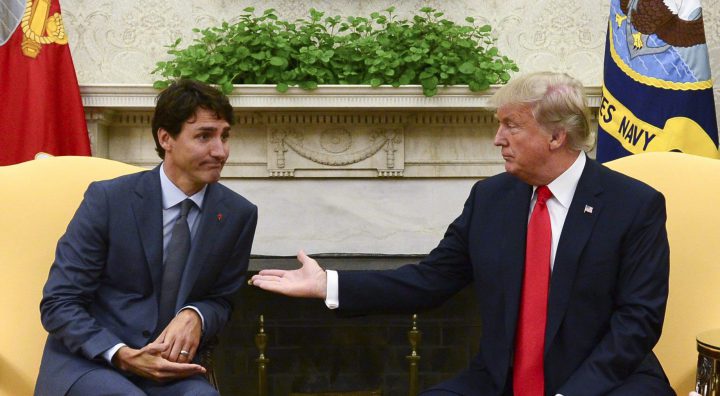Two members of U.S. President Donald Trump’s Cabinet suggested Wednesday that Canada and Mexico might escape new tariffs on steel and aluminum, a potential bargaining chip in North American trade talks that heeds the “surgical approach” advocated by House Speaker Paul Ryan.

“The president indicated that if we can work something out with Canada and Mexico they will be exempted. It’s not inconceivable that others could be exempted on a similar basis,” Commerce Secretary Wilbur Ross told reporters.
He said earlier on CNBC that the president has “indicated a degree of flexibility.”
WATCH: Canadian steel industry feels stuck in middle of political fights

Treasury Secretary Steven Mnuchin said the administration was “definitely going to end up” with the across-the-board tariffs Trump is seeking — 25 per cent on steel imports, 10 per cent on aluminum.
“But, again, there will be a mechanism where, to the extent that the president wants to give waivers, the president can do that,” Mnuchin told Fox Business.
WATCH: Trump says he’s ‘100 per cent’ behind steel, aluminum tariffs but ‘no trade war’

White House spokeswoman Sarah Huckabee Sanders said the White House was “on pace for an announcement” on the trade penalties “at the end of this week.”
Trump has said the tariffs are needed to preserve the American industries and protect national security, but he also has tried to use them as leverage in the current talks to revise the North American Free Trade Agreement, negotiated under President Bill Clinton.
“We’re cautiously optimistic on NAFTA,” Mnuchin said. “This is part of those discussions. But assuming we get the new NAFTA deal done, they will be exempted.”

Get weekly money news
White House adviser Jared Kushner and staff from the State Department and National Security Council planned to meet Wednesday with Mexico’s president and foreign minister in Mexico City.
WATCH: Peanut butter tariff: EU threatens one in response to proposed U.S. steel, aluminum duties

Congressional Republicans and industry groups, warning of the economic fallout, are pressing the president to narrow his plan, but he appears unmoved. “Trade wars aren’t so bad,” he said Tuesday, adding that the U.S. has long been “mistreated” in trade deals.
Hours later, Trump economic adviser Gary Cohn, who has opposed the tariffs, announced his plans to depart the White House.
Ryan, R-Wis., called for a “more surgical approach” that would help avert a trade war. Added Senate Majority Leader Mitch McConnell, R-Ky.: “We are urging caution,” McConnell said.
Asked about the calls from those leaders, Ross said the White House was “trying to do a surgical approach.”
Sen. David Perdue, R-Ga., who opposes the tariffs, said after meeting Tuesday with White House chief of staff John Kelly that the administration was willing to consider his views. “Absolutely. There’s an openness now,” Perdue said.
WATCH: Donald Trump’s top economic adviser Gary Cohn quitting post over steel tariffs

“I think there’s been a step back,” said Sen. Pat Roberts, R-Kan. “I don’t think he’s reconsidering, but I think he’s trying to figure out what his best step is forward.”
But those views sounded more like wishful thinking after Trump’s news conference with Sweden’s prime minister, when Trump reiterated his intentions.
Trump has been keenly aware of how the tariffs may play in a March 13 special House election in western Pennsylvania, part of the steel belt, White House officials have said. The president is headlining a Saturday rally in support of Rick Saccone, who is battling Democrat Conor Lamb in the Republican-leaning district.
The dispute over tariffs has exposed a rift between advocates of free trade, who have long dominated GOP circles, and a president who has railed against China and pushed for more protectionist trade policies.
Internally, White House officials who oppose the tariffs have urged the administration to limit the countries that would be affected and to impose time limits. This would help the president say he delivered on his promise and still try to avoid possible negative consequences, said Stephen Moore, a former campaign adviser and now an economist with the conservative Heritage Foundation.
Republicans in Congress and within Trump’s administration say industries and their workers who need steel and aluminum for their products would be hurt by Trump’s threatened tariffs. They say Americans will face higher costs for new cars, appliances and buildings if the president follows through on his threat and other nations retaliate.
Business leaders are mobilizing against the tariffs. The Aluminum Association, a trade group representing 114 member companies with more than 700,000 U.S. jobs, told Trump in a letter Tuesday that it was “deeply concerned” about the effects of the planned tariffs and urged him to seek alternatives such as targeting China and other countries with a history of circumventing trade rules.
Ryan said Trump was correct to focus on the problem of the dumping of steel in the U.S. at lower prices. But he said the administration’s approach was “a little too broad and more prone to retaliation.”
— Associated Press writers Alan Fram, Kevin Freking, Martin Crutsinger and Josh Boak contributed to this report.







Comments
Want to discuss? Please read our Commenting Policy first.